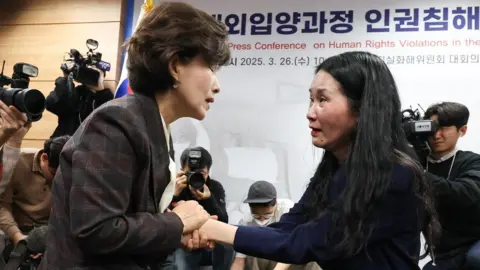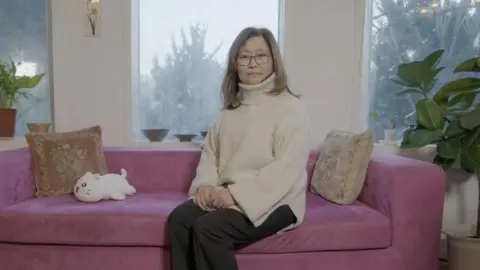BBC News
 News1
News1South Korea governments have committed many human rights violations for decades in a controversial program that sent at least 170,000 children abroad to adopt them.
She said that the lack of government in censorship enabled “collective export to children” by private agencies that were driven by profit, and found examples of fraud, fake records and coercion.
Since the fifties of the last century, South Korea has sent more children abroad to adopt more than any other country, with most of them sent to Western countries.
South Korea has moved to the tightening of its adoptions, but some of them adopt their biological affairs say they are still haunted by what they have gone through. The British Broadcasting Corporation spoke to a woman who claimed that her adopting parents “took betterly with the dog than ever.”
“This is a shameful part of our history,” Park Sun Young, Chairman of the Committee, told a press conference.
“While many adopters were lucky to grow up in loving families, others have suffered great difficulties and shock due to defective adoptions. To this day, many continue to face challenges.”
The report was issued on Wednesday by the Independent Truth and Reconciliation Committee after an investigation began in 2022.
Since then, 367 adopted – all of whom have been sent abroad between 1964 and 1999 – made petitions to claim the practices offered in the adoption process.
About 100 petitions have been analyzed so far, 56 of the adopters have been recognized as victims of human rights violations. The committee is still investigating other cases, with the selection of the investigation in May.
In the aftermath of the Korean war, South Korea was one of the poorest countries in the world, and few families were keen to adopt children.
Then the South Korean government began a national adoption program that is dealt with by private agencies, which gave important powers through private adoption laws.
But there was a “systematic failure in supervision and management”, which led to many of the lapses committed by these agencies, according to the report.
The report indicated that foreign agencies have demanded a specific group of children every month and Korean agencies complied with “facilitating the country's adoption on a large scale with the minimum procedural supervision.”
With no governmental organization on fees, Korean agencies imposed large sums and demanded “donations”, which turned the adoption into a “profit -based industry”, according to the report.
Other lapses include adoption without appropriate approval from birth mothers and insufficient examination of adopted parents.
The agencies also manufactured the reports that made children appear as if they were abandoned and placed for adoption; The children gave the wrong identities intentionally.
The report indicated that many adopters have false identities listed in their paperwork, they are now struggling to obtain information about their birth families and leave with insufficient legal protection.
The committee recommended an official apology and compliance with international standards on national adoption.
“You have lived a painful and miserable life.”
South Korea has moved to tighten its adoptions in recent years. In 2023, she issued a law that guarantees that all adoptions abroad will be dealt with by a government ministry instead of private agencies, which are scheduled to enter into force by July.
The South Korean government has not yet responded to the Wednesday report.
UNGER-TONEANED SHIN, 60, was one of the two affiliates who were investigated by the committee. She was adopted by a Norwegian couple when she was thirteen years old – and later discovered that her adoption was illegal.
 BBC/Hoso Lee
BBC/Hoso LeeThe couple, who were in the 1950s at the time, initially applied to adopt them but was rejected by the Norwegian authorities because they were older.
Then they traveled to South Korea and visited a house for orphans, where they chose a tone and took it with them to Norway.
The couple only submitted a request for adoption to the Norwegian authorities after years. The authorities agreed to this, despite the recognition that I am not submitting the Inding-Tone mode, because they decided that by that time it was no longer related to Korea.
Inier-tone BBC told that she had a great difficulty in adapting life in Norway, and her adoptive father claimed her sexual abuse.
“They took care of the dog better than they did,” she said. “It was very painful. I couldn't talk or express myself, unlike crying at night.”
In 2022, a lawsuit was filed against its local government in Norway and received compensation. She also received her local government's recognition that she is responsible for “failure to supervise” her adopted home.
Her parents have died of adoption since then.
She said, “They did not spend time in prison for what they had done to me. They picked up a criminal child outside the country … No one was responsible for what they did to me.”
While she was satisfied with the results of the committee's investigation, she said: “I was living in the wrong country and I had a painful and miserable life.”
“I do not wish this to anyone and I hope that they will not adopt any children from Korea.”




